Library
All resources
21 – 33 of 33 results

Mobile Money Transfers – For Humanitarian Assistance & Development Programming: Service Provider Perspective
Report
This report summarizes findings from research on how digital payment services providers in Africa have worked with Non-Governmental Organization (NGO) customers to deliver digital payments to their program participants/beneficiaries in the context of providing humanitarian assistance and/or for...
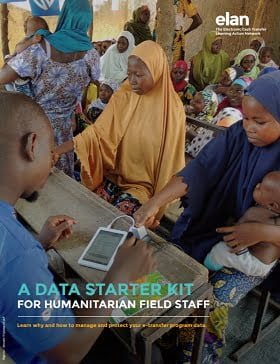
Data Starter Kit for Humanitarian Field Staff
Guidelines and Tools
A practical guide to help humanitarian field staff understand and manage data protection issues.

Prepaid Card Products For Humanitarian Programs: Actors, Insights & Recommendations
Guidelines and Tools
Today, over 130 million people need humanitarian support to survive. Fortunately, new tools such as prepaid cards allow us to respond to these needs with increasing flexibility and efficiency. Today’s leading humanitarian agencies are increasing their use of prepaid cards in places like Jordan, the...

Can E-transfers Promote Financial Inclusion in Emergencies: A Case Study from Bangladesh
Report
The Electronic Cash Transfer Learning Action Network (ELAN) launched research to build an evidence base around connecting emergency electronic transfer (e-transfer) recipients with additional financial services. They wanted to learn if, when, and how e-transfers can promote sustained uptake and use...
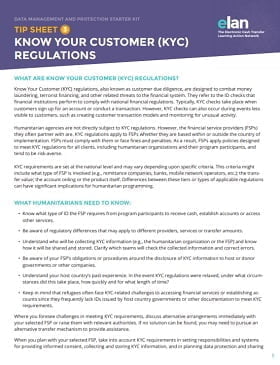
Data management and protection starter kit: Tip sheet 3: Know your customer (KYC) Regulations
Guidelines and Tools
Know Your Customer (KYC) regulations, also known as customer due diligence, are designed to combat money laundering, terrorist financing, and other related threats to the financial system. They refer to the ID checks that financial institutions perform to comply with national financial regulations....
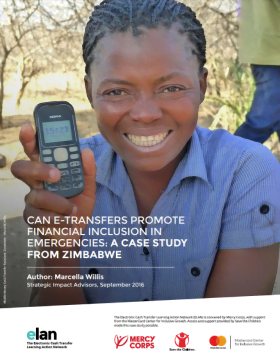
Can E-Transfers Promote Financial Inclusion in Emergencies: A Case Study from Zimbabwe
Case Study
The Electronic Cash Transfer Learning Action Network (ELAN) launched research to build an evidence base around connecting emergency electronic transfer (e-transfer) recipients with additional financial services. They wanted to learn if, when, and how e-transfers can promote sustained uptake and use...
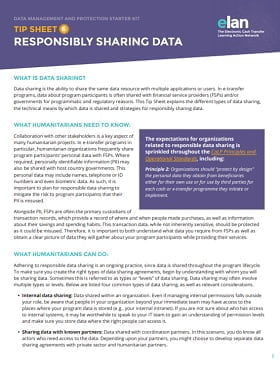
Data management and protection starter kit: Tip sheet 6: Responsibly Sharing Data
Guidelines and Tools
Data sharing is the ability to share the same data resource with multiple applications or users. In e-transfer programs, data about program participants is often shared with financial service providers (FSPs) and/or
governments for programmatic and regulatory reasons. This Tip Sheet explains the different...
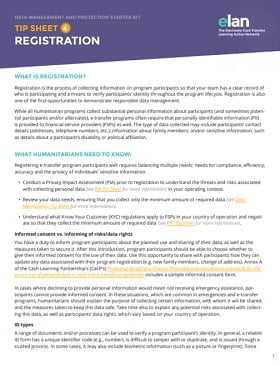
Data management and protection starter kit: Tip sheet 4: Registration
Guidelines and Tools
Registration is the process of collecting information on program participants so that your team has a clear record of who is participating and a means to verify participants’ identity throughout the program lifecycle. Registration is also one of the first opportunities to demonstrate responsible data...
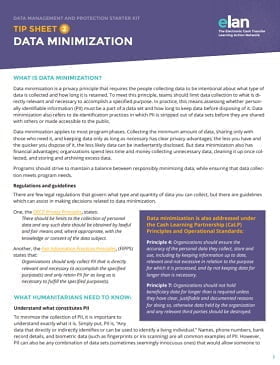
Data management and protection starter kit: Tip sheet 2: Data minimization
Guidelines and Tools
Data minimization is a privacy principle that requires the people collecting data to be intentional about what type of data is collected and how long it is retained. To meet this principle, teams should limit data collection to what is directly relevant and necessary to accomplish a specified purpose. In...
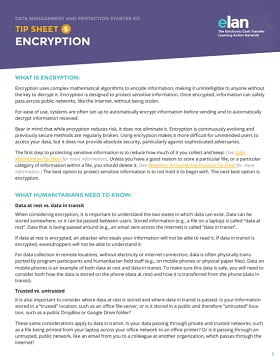
Data management and protection starter kit: Tip sheet 5: Encryption
Guidelines and Tools

Financial Services Primer for Humanitarians
Guidelines and Tools
Financial services facilitate a wide range of economic and households activities in any society. They enable trade and business expansion and allow individuals to save, send and borrow money. Humanitarian cash transfers, particularly when delivered electronically,can expand access to financial services...

Seeking Solutions: New roles for technology in cash and voucher programs – An inspiration brief for technology and private sector partners
Policy paper
Today, more people have been forced to flee their homes than at the height of World War II. The scale of these humanitarian crises are challenging, and sometimes outpacing, the capacity of institutions created to respond to them. Yet, the approaches we have available to reach populations in need have also...
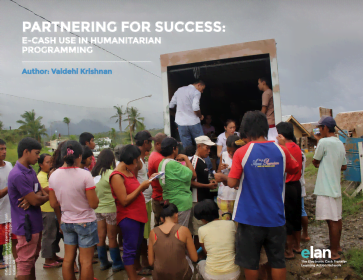
Partnering for Success: E-cash use in humanitarian programming
Policy paper
In recent years, new technologies have facilitated electronic cash transfers (e-transfers) to disaster- and conflict-affected populations. Utilizing e-cash in emergency response requires close partnerships with Financial Service Providers (FSPs), often in places where electronic payments are still...


